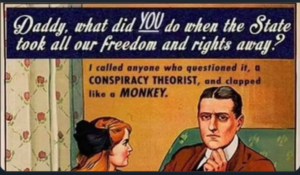Jim Bovard reviews some of the American myths that were, in 2020, exposed as such. A slice:
The benevolence and compassion of public school teachers was another myth that 2020 obliterated. Teacher unions helped barricade school doors the same way that segregationist governors in the 1950s and 1960s refused to obey federal court orders to admit black students. The Chicago Teachers Union proclaimed: “The push to reopen schools is based in sexism, racism, and misogyny.”
Black and Hispanic students suffered much larger learning losses due to school shutdowns, leading former Education Secretary John King to warn of a “lost generation of students.” Despite a deluge of studies that showed that schools posed little risk of fueling the pandemic, teachers insisted that they were entitled to both their salaries and to stay at home as long as they considered necessary.
This was part of the collapse of the broader myth that the rulers and ruled have common interests. Among other splits, the response to the pandemic divided Americans into those who work for a living, and those who “work” for the government. Government employees in most states and at the federal level have been the Untouchables, continuing to draw full pay even when they were no longer even required to show up for work.
Matt Welch dives into what was exposed in 2020 about American teachers’ – “teachers'” – unions.
Wow! The United Kingdom hasn’t seen mortality rates such as those in 2020 since waaaaay back in 2008.
Sandy Szwarc decries the terrible psychological damage caused by Covid-19 lockdowns.
David Henderson correctly calls for prices to play a greater role in vaccine ‘distribution.‘
Dr. Malcolm Kendrick wonders what is left to say about humanity’s deranged overreaction to Covid. Here’s his opening:
I have not written much about COVID19 recently. What can be said? In my opinion the world has simply gone bonkers.
Philosopher Sinead Murphy reminds us that life is not non-death. A slice:
What’s the big deal? – the Covid crew’s refrain. Let’s sort survival first; plenty of time afterwards for the arts of life to return.
But it is not like that. The habits of life, once broken, do not return easily and may not return at all. We trusted to them like we trust in the fidelity of a life-partner. Indeed, we hardly knew they were there – which of us has ever rejoiced in our freedom to meet whomever we choose, to travel wherever we wish, to leave home whenever we see fit? Which of us has noticed that we were ‘free’ to celebrate Christmas, to invite friends for a meal, to watch football down the pub? The arts of life are, by their nature, endemic. Their hold upon us is due to our trust in them. When they are suspended for purposes of survival, we may take them back again when given the chance, but some will be lost forever and the charms of others may never revive.
Most of the Covid restrictions were inconceivable this time last year. Now they have been made real, they can never be inconceivable again.
****
Happy New Year, everyone. I applaud and cherish all of you – you relatively few – who kept your heads and your humanity and spoke out against the inhumane, deranged, and cruel tyranny that were sledgehammered down on humanity in 2020. On this final day of this dreadful year, I am more pessimistic than I have ever been in my life. The precedents set in 2020 (and that will continue into 2021) are truly inhuman. They will, unless they are reversed, destroy civilization as we know it.
I hope on all that I hold dear and sacred that my pessimism is misplaced – that it is unwarranted and will soon prove to be wildly out of touch with reality.
But I must say that today – December 31st, 2020 – I remain shocked and indescribably saddened to learn just how many of my fellow human beings now appear to me to lack perspective, lack wisdom, lack prudence, lack good judgment, and lack a basic understanding of reality.
Here’s hoping that 2021 proves me wrong.


 Adam Smith pointed out that no one plans the enormously complex network of cooperative interactions that leads from the miner who mines the ore that becomes the shepherd’s shears to the shepherd to the wool cloth manufacturer to the urban worker’s wool coat. Nor does anyone plan the network of production, exchange, and distribution that brings every sort of footwear that anyone in your city might want to wear to some outlet in (or virtually in) your city. Such chains of coordination arise through a multitude of individually planned actions; but the chains as a whole and the larger networks of such chains are not intended by, and could not be successfully planned by, anyone.
Adam Smith pointed out that no one plans the enormously complex network of cooperative interactions that leads from the miner who mines the ore that becomes the shepherd’s shears to the shepherd to the wool cloth manufacturer to the urban worker’s wool coat. Nor does anyone plan the network of production, exchange, and distribution that brings every sort of footwear that anyone in your city might want to wear to some outlet in (or virtually in) your city. Such chains of coordination arise through a multitude of individually planned actions; but the chains as a whole and the larger networks of such chains are not intended by, and could not be successfully planned by, anyone. The dissolution of political, cultural and constitutional restraints on Congress obviously has served the interests of legislative careerists. They have a permanent, inherent vocational incentive to borrow to finance current expenditures.
The dissolution of political, cultural and constitutional restraints on Congress obviously has served the interests of legislative careerists. They have a permanent, inherent vocational incentive to borrow to finance current expenditures.

